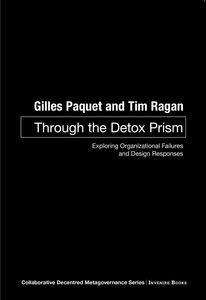
Through the Detox Prism
Exploring Organizational Failures and Design Responses
Gilles Paquet
Tim Ragan
This short book throws some light on the modern-day pathologies that are crippling the productivity, resilience, innovation and survival of our private, public and social organizations, and therefore of our standard of living. It probes the proximate sources of dysfunction at five interfaces: between the organization and its employees (x-inefficiency), its value chain upstream (escaping fault), its socio-physical environment (externalities), its governance regime (hijacking by certain groups), and its ethical context (moral vacancy). Toxicities at these five interfaces are interrelated and moral vacancy is of central importance in this complex of relationships that may be the source of something like two-thirds to three-quarters of the observed waste. Our inquiry, built around the Detox Prism, gauges the toxicity at these five interfaces, probes their sources, and suggests useful families of design repairs based on a mix of mechanisms of practical use in the different sectors. This detox perspective is based on a systematic effort to lift both analysts and practitioners with the skyhook of a crane in order to broaden their outlook, to lengthen their time horizon, and to help them escape from mental prisons to inspire effective and practical design thinking.
Book details
-
Publisher
-
Language
French -
Publication date
-
Page count
133 -
Theme
About the author
Gilles Paquet
Gilles Paquet (1936–2019), O.C., MRSC, was Professor Emeritus at the Telfer School of Management and a Senior Research Fellow at the Centre on Governance of the University of Ottawa. He was a Fellow of the Royal Society of Canada and of the Royal Society of Arts of London, and served as President of the Royal Society of Canada (2003–2005). He studied at Laval, Queen's (Canada) and at the University of California (Los Angeles) where he was Postdoctoral Fellow in Economics. He taught at Carleton University for almost 20 years before joining the University of Ottawa in 1981. He received honorary doctorates from Queen's, Laval, and Thompson Rivers University, received the Public Service Citation Award of APEX, and was made Honorary Member of l'Association des économistes québécois. He was made Member of the Order of Canada in 1992.






